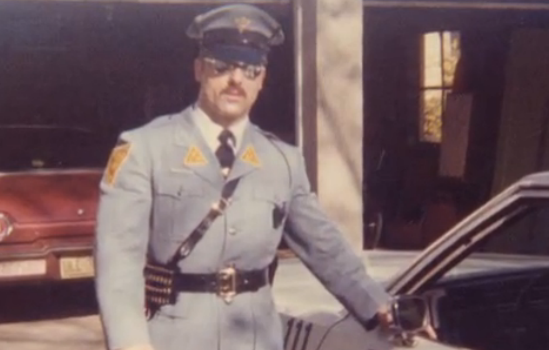
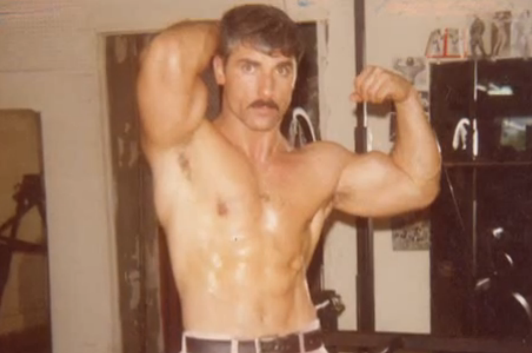
—–
Note from Joe D: During the past few weeks I have received more questions regarding Police/Fireman training than ever before. As the son of a former NJ State Trooper (who took his job very seriously), I am extremely happy to see an increased interest in training from police officers and firemen. The notion that all cops are fat and hang out at donut shops has got to stop! So I asked Pat Carozza to provide some info with regards to how we train our police/fireman clients at DeFranco’s. (Pat is currently training a number of police officers at my facility.) The following information provides a general blueprint on how all police/firemen should be training in order to truly ‘protect & serve’…
—–
At DeFranco’s, we have always had a steady stream of police officers training at the gym. If you are familiar with Joe and his gym, you know his dad was a NJ State Trooper and an absolute beast in the weight room! Needless to say – because of this – we have taken for granted how cops should train for their profession. That all changed a few weeks ago when a local police officer walked through our doors. What I saw was an intimidating-looking dude with a lot of muscle. But, after having him do a couple of drills in my evaluation, I was sure I could outrun him without a problem. Furthermore, if we ever had to wrestle, I think that he might be able to take me, but he would probably end up with a back injury with one quick twist! He looked like Arnold, but unfortunately, he ran like him as well!
Truth be told, I have forgotten how many times I have seen police officers who do nothing but “bodybuilding” workouts. This type of training isn’t going to help them wrestle a meth head to the ground – without ending up in an emergency room themselves. The end result is big muscles that fill out the uniform (as well as imbalances), a loss of mobility, and a loss of explosiveness. This is a recipe for disaster. I can’t understand this because your life could literally depend on you being stronger and in better condition than the guy trying to wrestle you for your gun! The only thing worse than this is police officers who do nothing at all!
So how exactly should our police force be training? What is the answer for a profession where it’s important to be able to move, be strong, be explosive, sprint, jump, and do so repeatedly — as well as look the part of a badass who could kick your ass if you get out of line?
I think you know what I’m going to say…the answer is to train like an athlete!
Let’s analyze this a bit further, shall we? Athletes need to be able to sprint and sprint fast. They need to have the endurance to do it repeatedly, or for a prolonged distance. They need to be explosive in movements – whether it’s tackling, punching, jumping, sprinting, or wrestling. They need to have great mobility in order to avoid injury and perform at a high level. In essence; they need everything that Brian Cushing and Demeco Ryans need! So why not train like them?
Here are some guidelines of what you should be doing if you’re a police officer or fire fighter:
1. Always start your workout with a good WARM-UP that includes dynamic movements, addresses muscular imbalances and any mobility restrictions that are present. This should include thoracic mobility drills, hip mobility, body weight calisthenics, and possibly (depending on the person) some aerobic work.
- How would you know any of this? The answer is simple; go get screened – or better yet – find a trainer you can trust. Preferably someone who works with athletes (and is successful) and pay them to train you. This is your life we’re talking about! I think you would agree it’s worth it! PLUS IT’S A TAX WRITE OFF!
2. Use EXPLOSIVE MOVEMENTS in your workouts. At DeFranco’s, we are big fans of jumps and med ball throws. They are easier on the body than Olympic lifts, easy to learn, and are explosive as hell! They will help with punching power and your ability to quickly take down a “bad guy” if/when needed.
- Below you’ll see a police officer performing explosive jumps. In this series, the officer performs a box jump into a jump into our foam pit. (The “pit” removes joint stress upon landing.) Remember the idea is to keep “ground” contact (in this case, contact on the box) limited to as little time as possible!
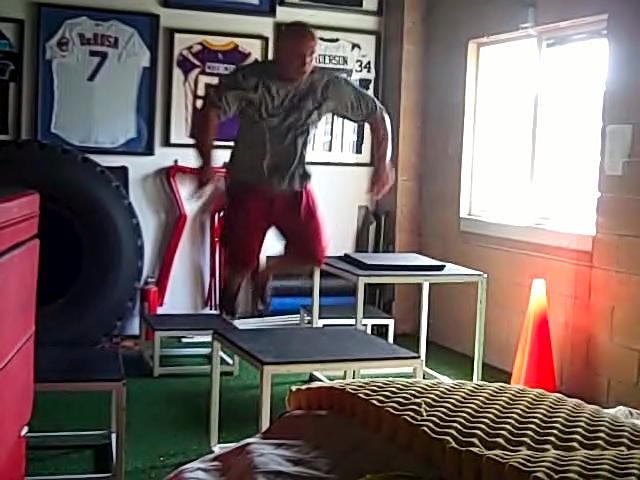
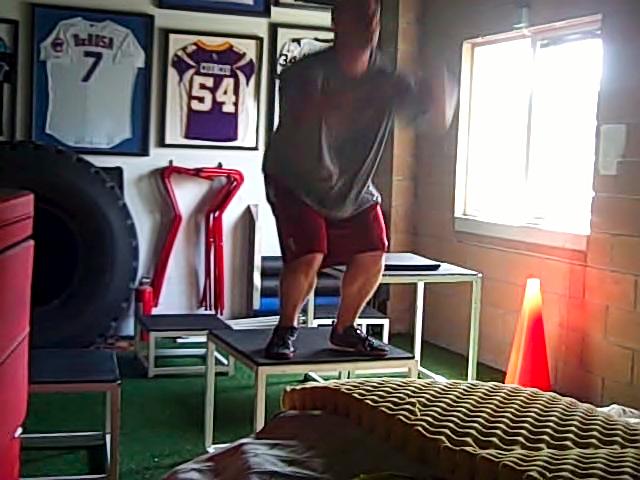
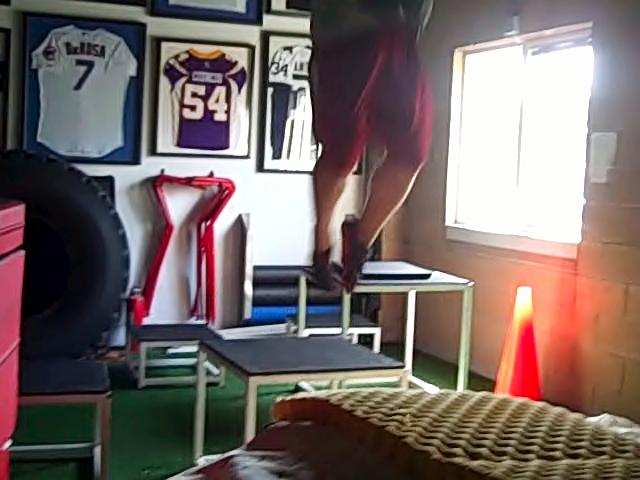
- I’m also a big fan of broad jumps and bounding. The forces one has to put into the ground to perform these movements leaves the body no choice but to become stronger and more powerful. Keep in mind that – like anything else – there can be too much of a good thing. Jumps, like sprints, can be taxing and should be limited.
- In the pictures below, the officer is performing a med ball chest pass with a broad jump. When performing this exercises, make sure to keep a flat back and to explode out, not up. The goal is to fully extend when throwing the ball. (If you can’t fully extend, the ball is too heavy.) Throw the med ball as far as you can!
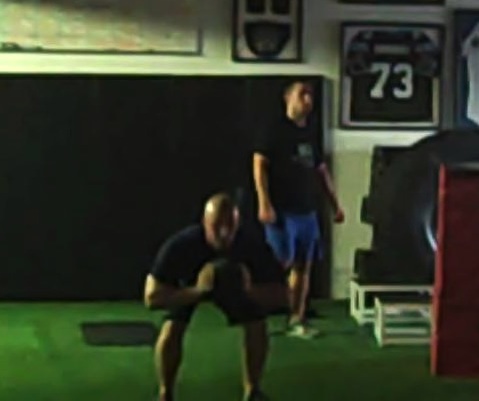
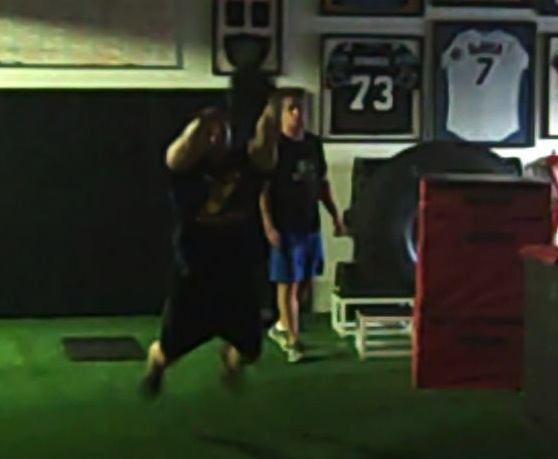
- In the following photos the officer is performing “Caber tosses” (backward/overhead) using a med ball. Again, you want to make sure you keep a flat back at the start of the movement and achieve full extension upon throwing the ball. Throw the ball with max intensity…you want it to go as far as possible!
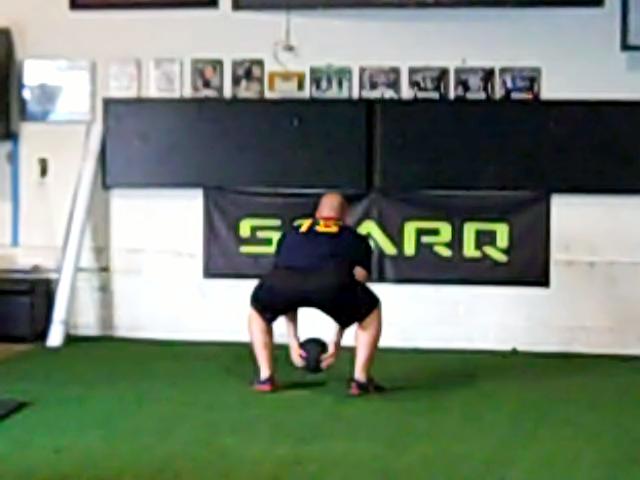
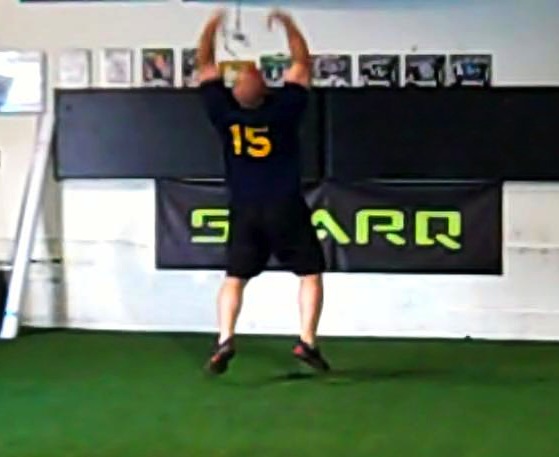
- Include sprints in your workout plan. Remember to allow yourself full recovery in between sprints. If you don’t, then you are just doing conditioning. (FYI, there is a difference between ‘speed training’ and ‘conditioning’. They are not the same thing. Police officers need to train them both.) It might be a good idea to learn how to run correctly as well…after all, the more bad guys you can run down, the faster you’ll get promoted!
4. Train for STRENGTH!
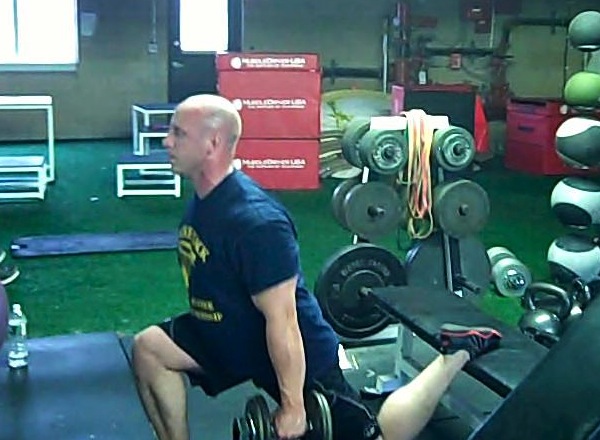
- As you know, police work can involve hand-to-hand combat. In these scenarios it is imperative that one not only be able to last for however long the fight lasts, but have the strength to subdue the person and win the fight. We still bench and squat in our programs, but we take into account the individual’s specific needs and adjust the program accordingly. For instance, the officer pictured above was having some shoulder issues when he came to us. I concluded his issues were mainly due to his limited thoracic mobility and began a program to address that issue. While addressing it, I had him doing floor presses to avoid unnecessarily over-loading the shoulder and I utilized single leg squats to avoid any stress on the shoulder from barbell squatting.
5. Train the ENERGY SYSTEMS and be in good AEROBIC SHAPE.
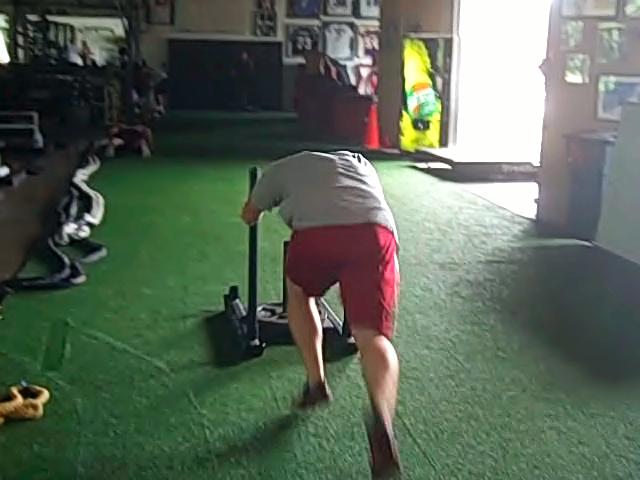
- The idea that all cops are fat and eating donuts is getting on my nerves…AND I’M NOT EVEN A COP! Utilize hill sprints, prowler sprints and tempo runs in your program and you’ll be able to run down coke dealers for days and wrestle meth heads till they come down from their high!
6. Train the CORE!
- Don’t forget that a strong core helps in all other areas and can be done daily at varying intensities. As Joe D. says, “Strong arms and legs are worthless if you have a ‘marshmallow in the middle’ and you can’t display the strength in your limbs.”
7. Last but not least…GET FLEXIBLE!
- Stretching helps keep you healthy and feeling good while you’re driving around in your patrol car. Being flexible will also drastically reduce your chances of getting injured when you get called to action!
This was just a basic outline of what a police/fireman’s program should include. Take this information and use it wisely! Start training in a way that will not only have you looking good, but will also help you perform your job better!
*If you would like to start training the correct way, feel better, and be better at your job, you can contact me by calling DeFranco’s Gym or emailing me at pat@defrancostraining.com.
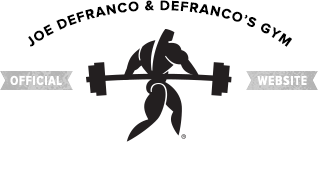




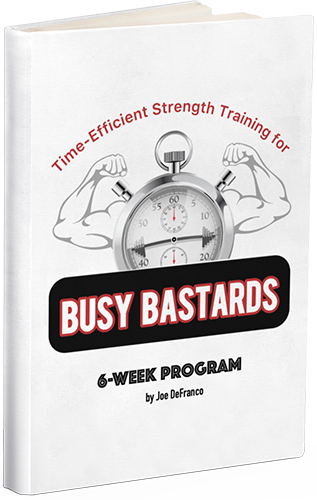
Hi Joe My Name is Greg DeFranco I live in Merrick New York I am a follower of you and am a Triathlete and Novice Boxer and have competed in events at the Police Olympics My Children Carolyn DeFranco age, 17. and Gregory DeFranco 17 are National Swimmers what one exercise would you recommend for them. I am a New York City Detective with 30 years of service I was happy to see that your Dad was a Trooper now I can see where you got it from. I used to live in Rutherford I know where you office is at the Field. Thank you for all of you Great training tips.